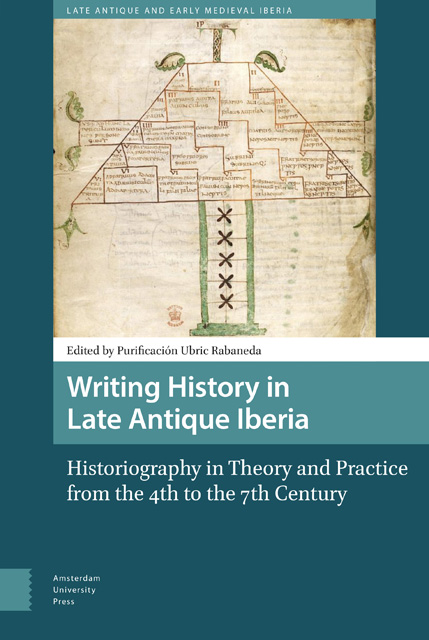 Writing History in Late Antique Iberia
Writing History in Late Antique Iberia Book contents
- Frontmatter
- Table of Contents
- 1 Writing History in Late Antique Iberia: Theory and Praxis
- 2 Para qué sirve la Historia : Principios teóricos de la historiografía hispana tardoantigua
- 3 From Christian Historiography to the Emergence of National Histories : Spanish Historiography between Romans and Visigoths
- 4 Orosius: An Iberian Patriot’s History of Rome
- 5 Orosius, Barbarians, and the Christian Success Story
- 6 Prophecies and Omens of the Fall of the Roman Empire in the Chronicle of Hydatius of Lemica
- 7 La dimensión política de los historiadores del reino visigodo de Toledo
- 8 The Definitions and Uses of Historia in Isidore of Seville
- 9 Bishops and Their Biographers : The Praxis of History Writing in Visigothic Iberia
- 10 Local Powers and Construction of the Past in the Visigothic Kingdom of Hispania
- 11 The Contemplation of the Past in the Libellus Precum of Faustinus (and Marcellinus)
- 12 Orthodoxy and Heterodoxy : The Historiography of Hispania in Late Antiquity
- 13 Expulsados de la Historia : El argumento histórico en la polémica antijudía hispana (siglos IV-VII)
- 14 Consideraciones sobre la temporalidad en las Vitae Sanctorum visigóticas
- 15 The Image of Leovigild as Arian Monarch in the ‘Vitas Patrum Emeritensium’ : From Historical Reality to Hagiographical Deformation
- Index
1 - Writing History in Late Antique Iberia: Theory and Praxis
Published online by Cambridge University Press: 18 April 2023
- Frontmatter
- Table of Contents
- 1 Writing History in Late Antique Iberia: Theory and Praxis
- 2 Para qué sirve la Historia : Principios teóricos de la historiografía hispana tardoantigua
- 3 From Christian Historiography to the Emergence of National Histories : Spanish Historiography between Romans and Visigoths
- 4 Orosius: An Iberian Patriot’s History of Rome
- 5 Orosius, Barbarians, and the Christian Success Story
- 6 Prophecies and Omens of the Fall of the Roman Empire in the Chronicle of Hydatius of Lemica
- 7 La dimensión política de los historiadores del reino visigodo de Toledo
- 8 The Definitions and Uses of Historia in Isidore of Seville
- 9 Bishops and Their Biographers : The Praxis of History Writing in Visigothic Iberia
- 10 Local Powers and Construction of the Past in the Visigothic Kingdom of Hispania
- 11 The Contemplation of the Past in the Libellus Precum of Faustinus (and Marcellinus)
- 12 Orthodoxy and Heterodoxy : The Historiography of Hispania in Late Antiquity
- 13 Expulsados de la Historia : El argumento histórico en la polémica antijudía hispana (siglos IV-VII)
- 14 Consideraciones sobre la temporalidad en las Vitae Sanctorum visigóticas
- 15 The Image of Leovigild as Arian Monarch in the ‘Vitas Patrum Emeritensium’ : From Historical Reality to Hagiographical Deformation
- Index
Summary
Abstract
This collective volume reflects on the motivations underpinning the writing of history in Late Antique Iberia, emphasising its theoretical and practical aspects and outlining the social, political, and ideological implications of the constructions and narrations of the past. The writing of History in Late Antique Iberia was penned by ecclesiastics, most of them bishops, linked to the privileged sectors of society and intimately connected to groups of episcopal, monastic and political power, who were also the main recipients of their writings. Their vision of History became one of the main propagandistic agents of the ideology of the elites in the final centuries of the Roman Empire and in the nascent barbarian kingdoms, especially in the Visigothic Catholic Kingdom of Toledo.
Keywords: Historiography, Late Antique Iberia, Historian, Church, History Writing
In antiquity, there was no such figure as the professional academic historian as we understand it today. Transmission of and reflection on past or present was conceived of as a service to the state, society, God, or the Church. It was done by persons belonging to the elite, who utilised History as a source of social power. The writing of History in Late Antique Iberia was penned by ecclesiastics such as Hydatius of Lemica, John of Biclaro, Isidore of Seville or Julian of Toledo, among others; most of them bishops, linked to the privileged sectors of society and intimately connected to groups of episcopal, monastic, and political power, who were also the main recipients of their writings. According to their vision, God was the rerum actor of historical events. In line with this perception, the rerum gestarum scriptor became a passive figure, a mere transmitter of the divine incidence in human history. A careful examination of the historical works by ecclesiastics shows us, however, that the Christian rerum gestarum scriptor was not an impartial or passive emissary of the events of the past. On the contrary, his presentation and reflection on that past, which, on many occasions, was about his own present, was active and committed and obeyed particular political and ideological motivations and interests.
- Type
- Chapter
- Information
- Writing History in Late Antique IberiaHistoriography in Theory and Practice from the 4th to the 7th Century, pp. 7 - 20Publisher: Amsterdam University PressPrint publication year: 2022


